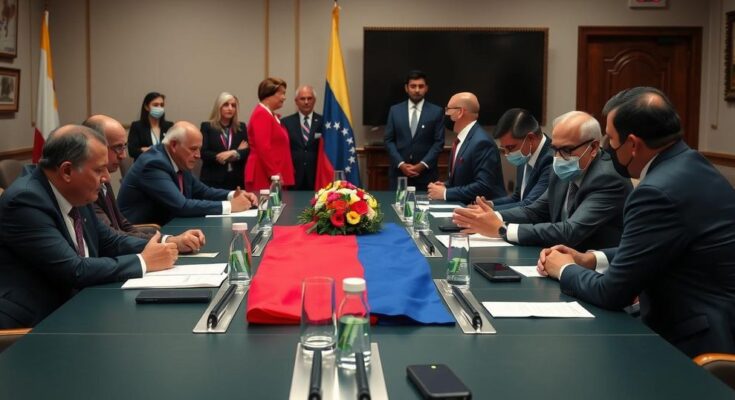Costa Rica, Ecuador, Panama, and the Dominican Republic condemned Nicolás Maduro’s inauguration for a third term in Venezuela on January 10, 2019, citing fraudulent elections. The opposition claims that Edmundo González Urrutia legitimately won the presidency, calling Maduro a “dictator.” As political detentions rise and international criticism mounts, the ADD seeks to promote democratic reforms in Venezuela.
On January 10, 2019, Costa Rica, Ecuador, Panama, and the Dominican Republic formally rejected the inauguration ceremony of Nicolás Maduro for a third term in Venezuela, labeling the event as illegitimate due to widespread allegations of electoral fraud. The four nations, part of the Alliance for Development in Democracy (ADD), denounced the inauguration as a product of a fraudulent election, allegedly marked by state-sponsored terror against the citizens of Venezuela. This response reflects a regional consensus against what these governments perceive as a breakdown of democratic governance in Venezuela.
Maduro, who has held the presidency since 2013, was sworn in during a ceremony that drew criticisms from various international stakeholders, including the United States and the European Union. Opposition leader Edmundo González Urrutia claimed victory in the controversial July 28 presidential elections, asserting that the inauguration represented a usurpation of power. He declared that Maduro “crowns himself dictator” while asserting that there was overwhelming evidence of voter support for his candidacy as opposed to that of Maduro.
The Venezuelan electoral authorities asserted that Maduro won the election with 52% of the vote but have yet to provide a detailed count of the ballots, which is mandated by law. The opposition alleges that González Urrutia garnered approximately 70% of the electorate’s support, highlighting significant discrepancies in the election results. The ADD expressed their commitment to collaborating with the international community to facilitate a democratic transition in Venezuela, aiming to end the ongoing oppression and systemic violations of human rights.
Moreover, Alfredo Romero, president of the NGO Foro Penal, noted an alarming trend in political detentions, reporting 49 arrests with political motives since the beginning of the year. UN Secretary-General Antonio Guterres has expressed serious concern regarding the situation in Venezuela, advocating for the release of individuals classified as “arbitrarily detained.” This situation continues to highlight the growing crisis surrounding governance and civil liberties in Venezuela.
The political landscape in Venezuela has been marred by controversy and allegations of fraud, particularly following the presidential elections. These elections have faced rebuke from numerous international actors, leading to a consensus that Maduro’s legitimacy as a leader remains in question. The ADD’s firm stance against Maduro’s inauguration underscores a regional effort to challenge authoritarianism and support a democratic framework within Venezuela, which has been deemed by many as suffering under oppressive governance.
In conclusion, the rejection of Nicolás Maduro’s inauguration by Costa Rica, Ecuador, Panama, and the Dominican Republic illustrates a profound concern regarding the state of democracy in Venezuela. As allegations of electoral fraud prevail, the support for opposition figures like Edmundo González Urrutia reflects a significant push for change. Both national and international calls for accountability and human rights protections continue to amplify the urgent need for a democratic transition in the country.
Original Source: ticotimes.net




